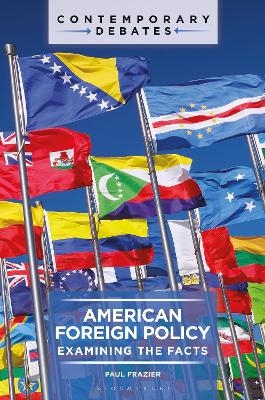
American Foreign Policy
Bloomsbury Academic (Verlag)
978-1-4408-7941-8 (ISBN)
- Noch nicht erschienen (ca. Januar 2025)
- Versandkostenfrei
- Auch auf Rechnung
- Artikel merken
How much foreign aid does the United States give foreign countries? How many military bases do US forces have around the world, and for what reasons? Why are US attitudes about the North Atlantic Treaty Organization (NATO) so important to economic and political stability in Europe? Where do America's political parties stand on issues of free trade, counterterrorism, human rights, economic exploitation, and international cooperation on environmental issues such as climate change? How have US relations with China and Russia changed over the last half century?
This fact-checking resource answers all these questions and more, drawing on essential primary sources, authoritative government studies and reports, and top experts in the field. Rather than a specific ideological approach to the topic, this book presents the facts pertaining to the most consequential issues in American foreign policy and international relations today.
Paul Frazier is Professor of History at Gateway Community and Technical College, Kentucky, USA.
American Foreign Policy
1: The United States and the World
Q1. Is it true that the United States contributes more to NATO than any other single nation?
Q2. Does membership in the United Nations enhance American foreign policy?
Q3. Does the United States maintain military bases all over the world?
Q4. Does collective security work?
Q5. Does the United States support or have alliances with non-democratic states?
2: Foreign Policy Concepts
Q6. Is the Thucydides Trap real?
Q7. Do the concepts of power vacuum and balance of power still drive foreign policy?
Q8. When is soft power most frequently used to address foreign policy challenges?
Q9. When is hard power most frequently used to address foreign policy challenges?
Q10. What are the central theories for international relations?
3: Foreign Policy Motives
Q11. Does the United States foreign policy include preemptive warfare?
Q12. What is just war theory and how does it apply to American foreign policy?
Q13. Is American foreign policy primarily concerned with national security?
Q14. Does the United States give foreign aid to other countries?
Q15. Does American foreign policy involve nation building?
4: Foreign Policy in History
Q16. Has the United States been mostly an isolationist country?
Q17. Did American foreign policy change dramatically after 9/11?
Q18. What was the Bush Doctrine, and did it achieve its objectives?
Q19. What was the Obama Doctrine, and did it achieve its objectives?
Q20. Was America’s Cold War Containment Policy successful?
5: Foreign Policy in a Democratic Society
Q21. Does modern day news media influence American foreign policy?
Q22. Does public opinion play a role in America’s foreign policy?
Q23. Does the American president have greater authority in foreign policy than in domestic policy?
Current and Future Issues in American Foreign Policy
Q24. Is China a threat to the United States?
Q25. Is Russia a threat to the United States?
Q26. What factors have shaped U.S. involvement in Africa’s wars?
Other Factors in American Foreign Policy
Q27. Does concern for human rights drive American foreign policy?
Q28. Do environmental factors like climate change play a role in foreign policy?
Q29. Does farming and agriculture have an impact on foreign policy?
Q30. What role does economics play in foreign policy?
| Erscheint lt. Verlag | 23.1.2025 |
|---|---|
| Reihe/Serie | Contemporary Debates |
| Verlagsort | London |
| Sprache | englisch |
| Maße | 156 x 235 mm |
| Themenwelt | Sozialwissenschaften ► Politik / Verwaltung ► Europäische / Internationale Politik |
| ISBN-10 | 1-4408-7941-9 / 1440879419 |
| ISBN-13 | 978-1-4408-7941-8 / 9781440879418 |
| Zustand | Neuware |
| Informationen gemäß Produktsicherheitsverordnung (GPSR) | |
| Haben Sie eine Frage zum Produkt? |
aus dem Bereich


